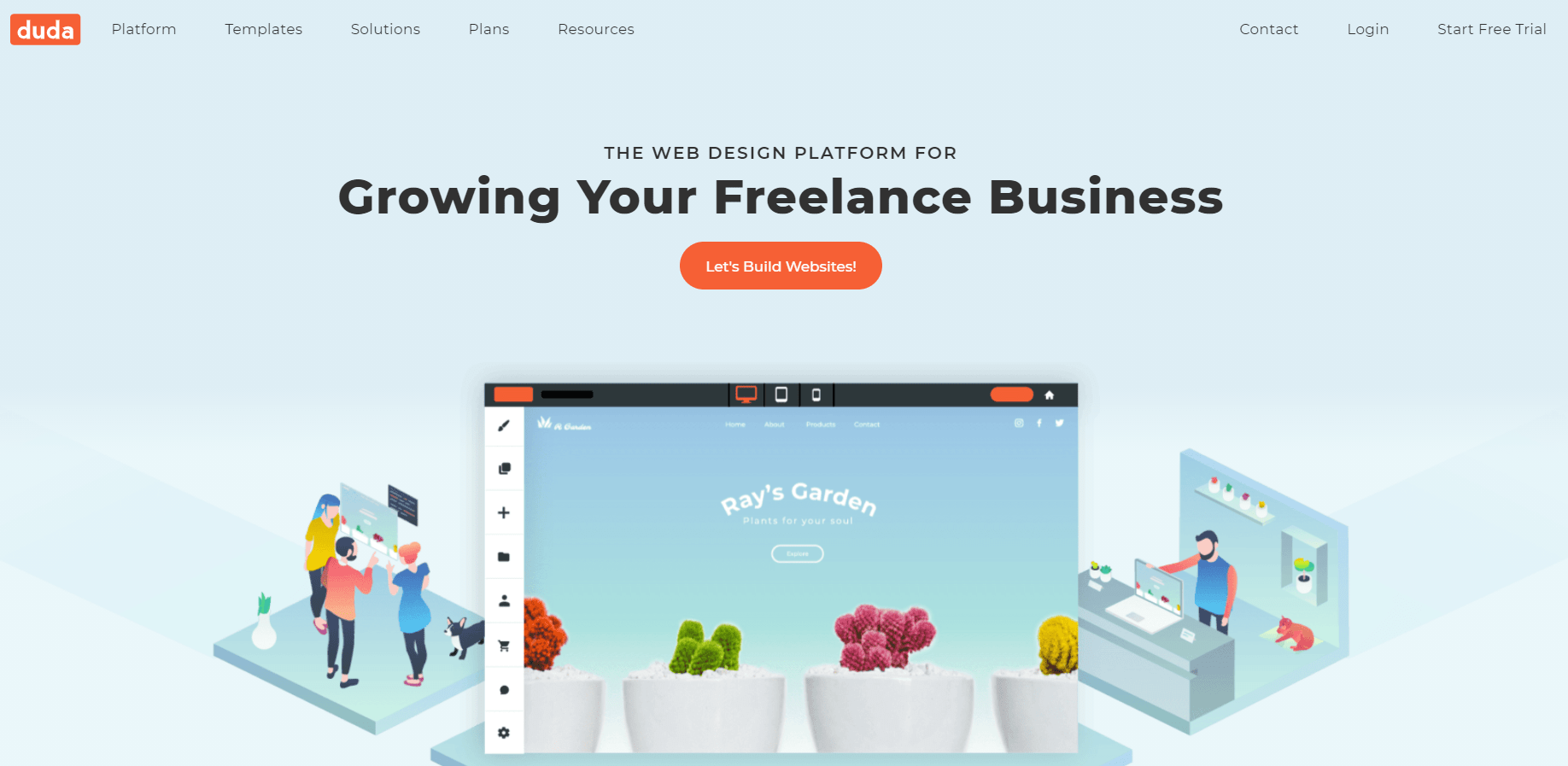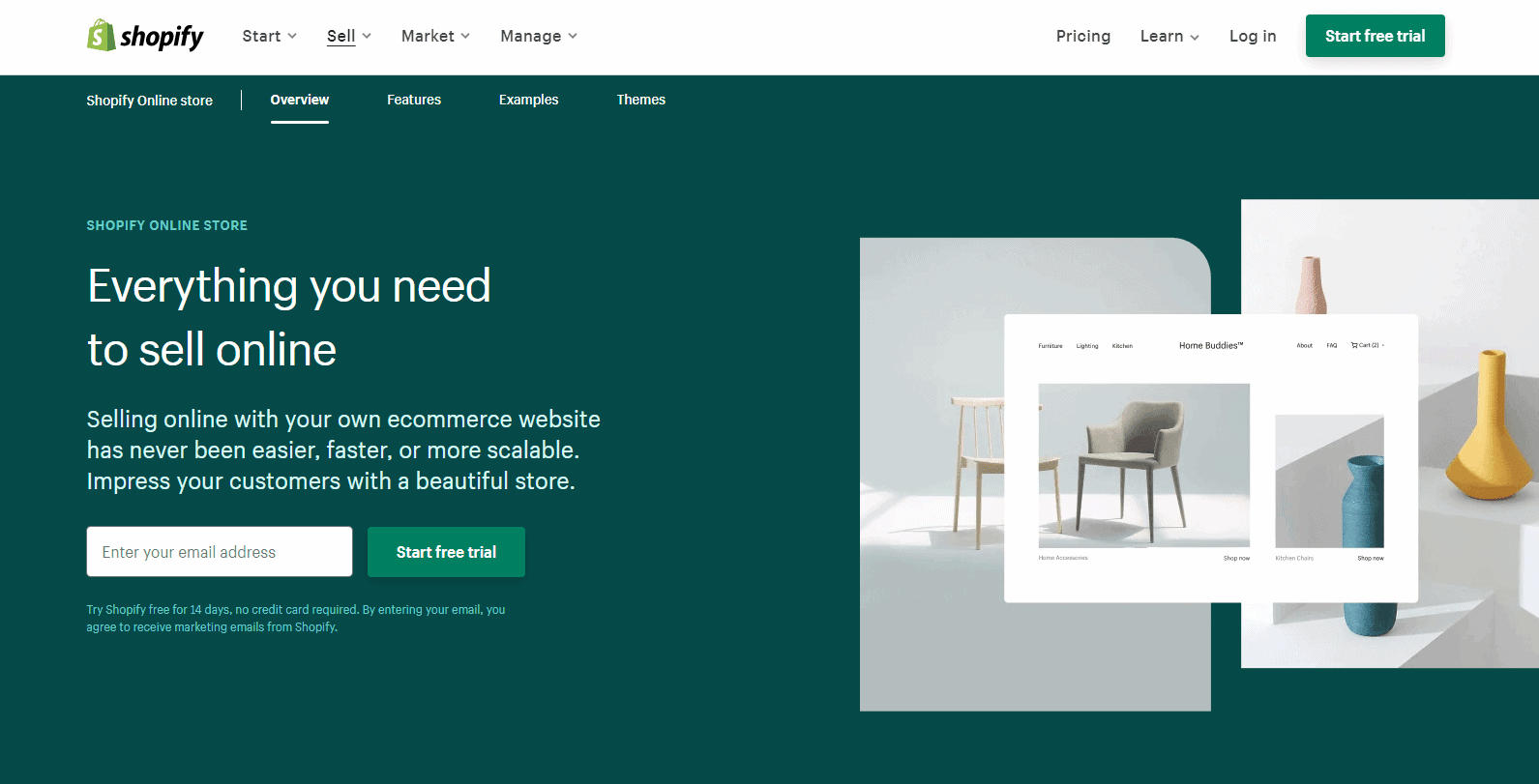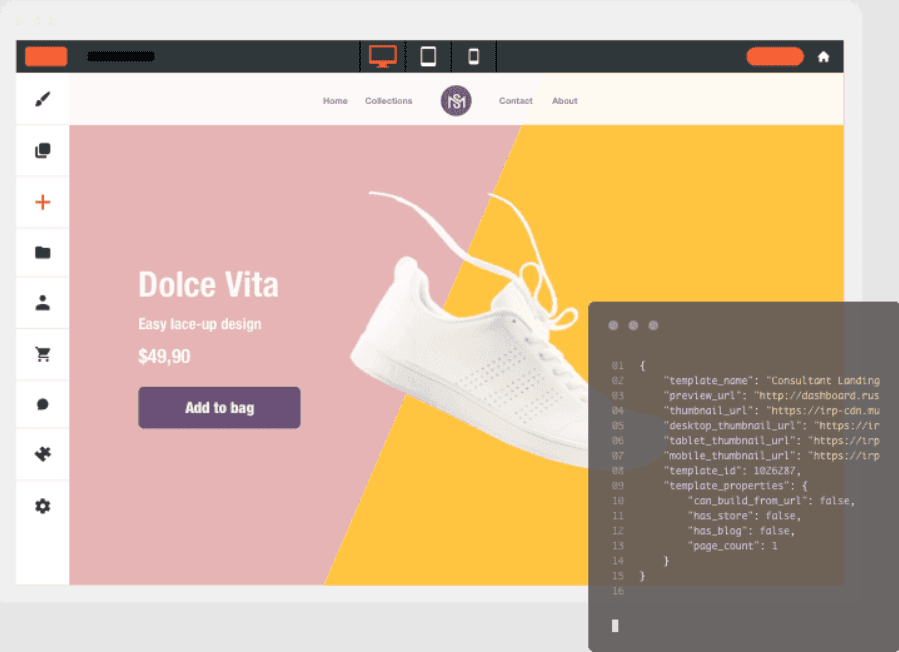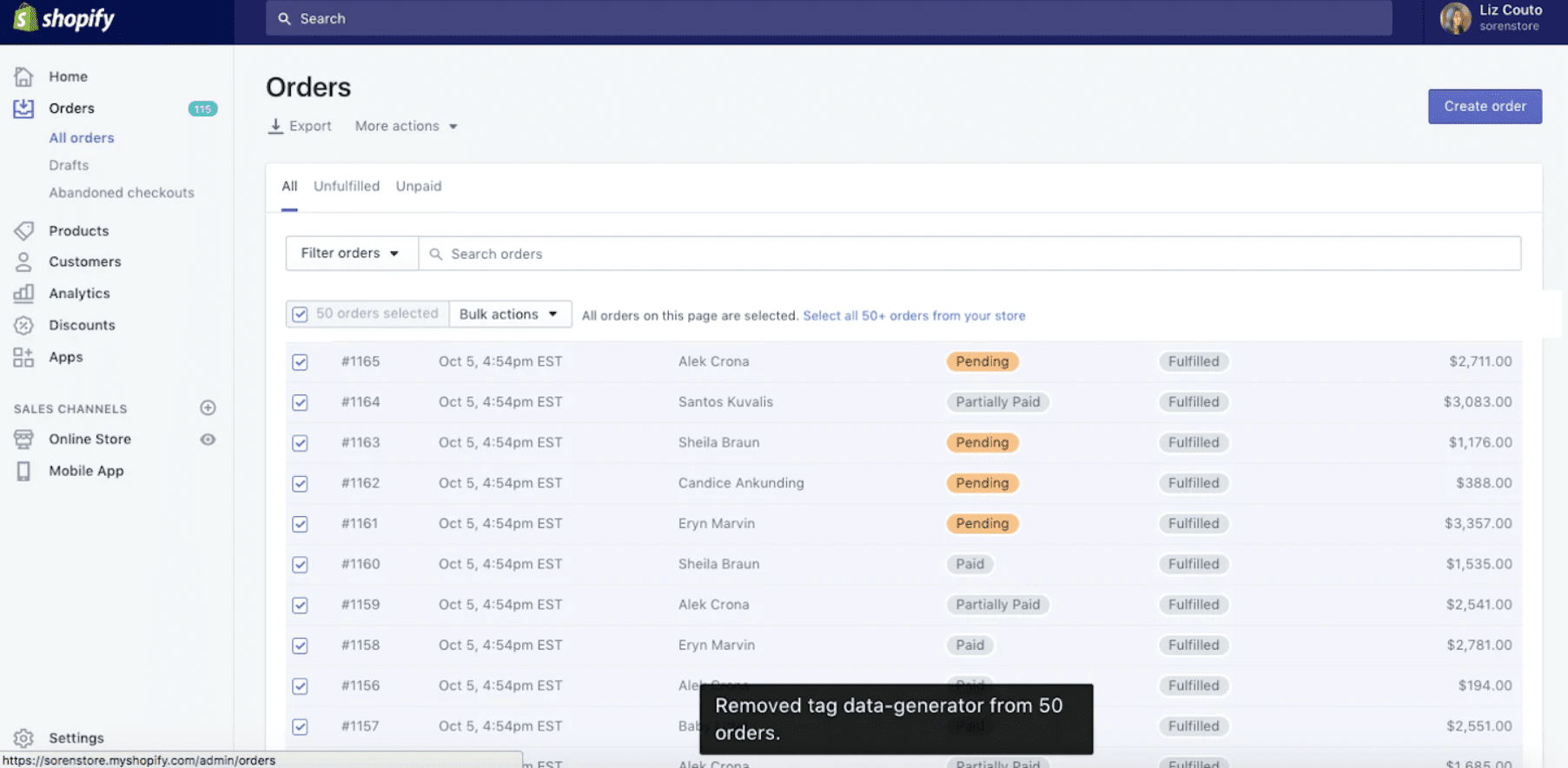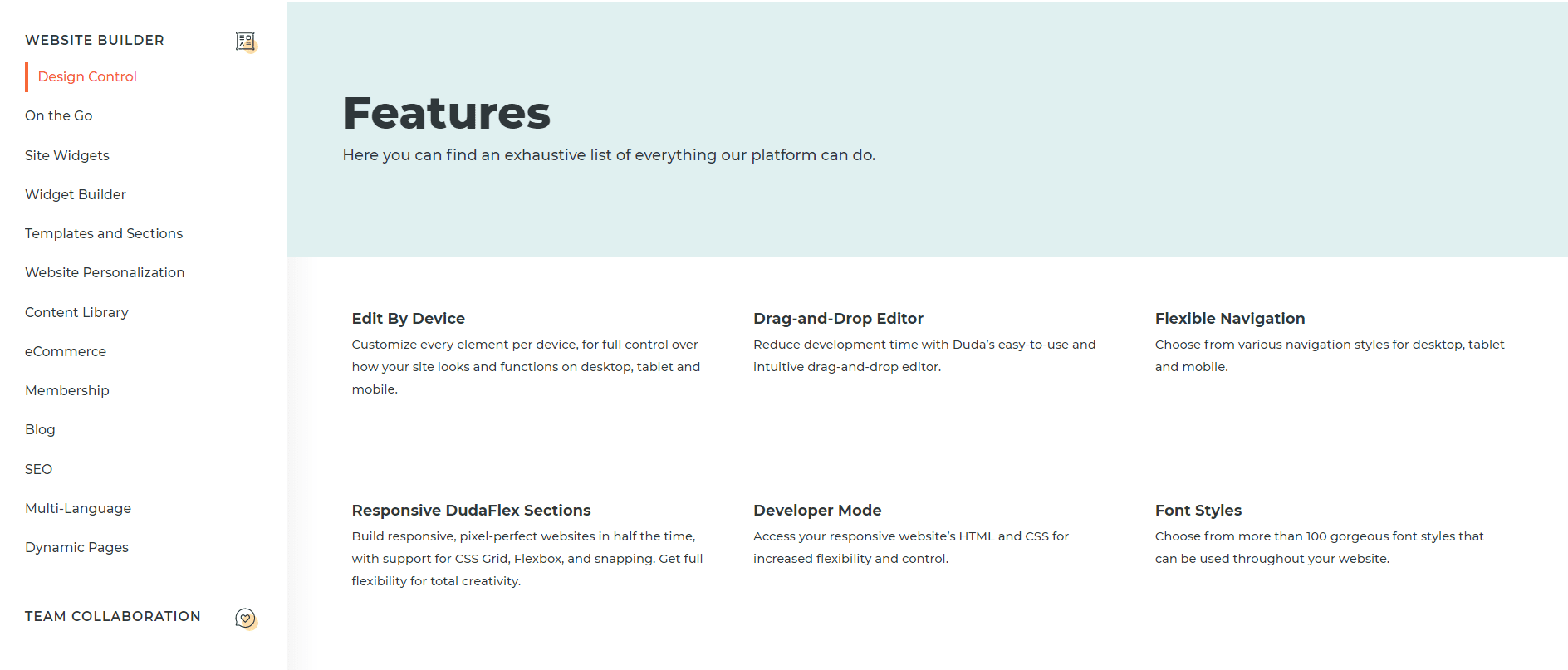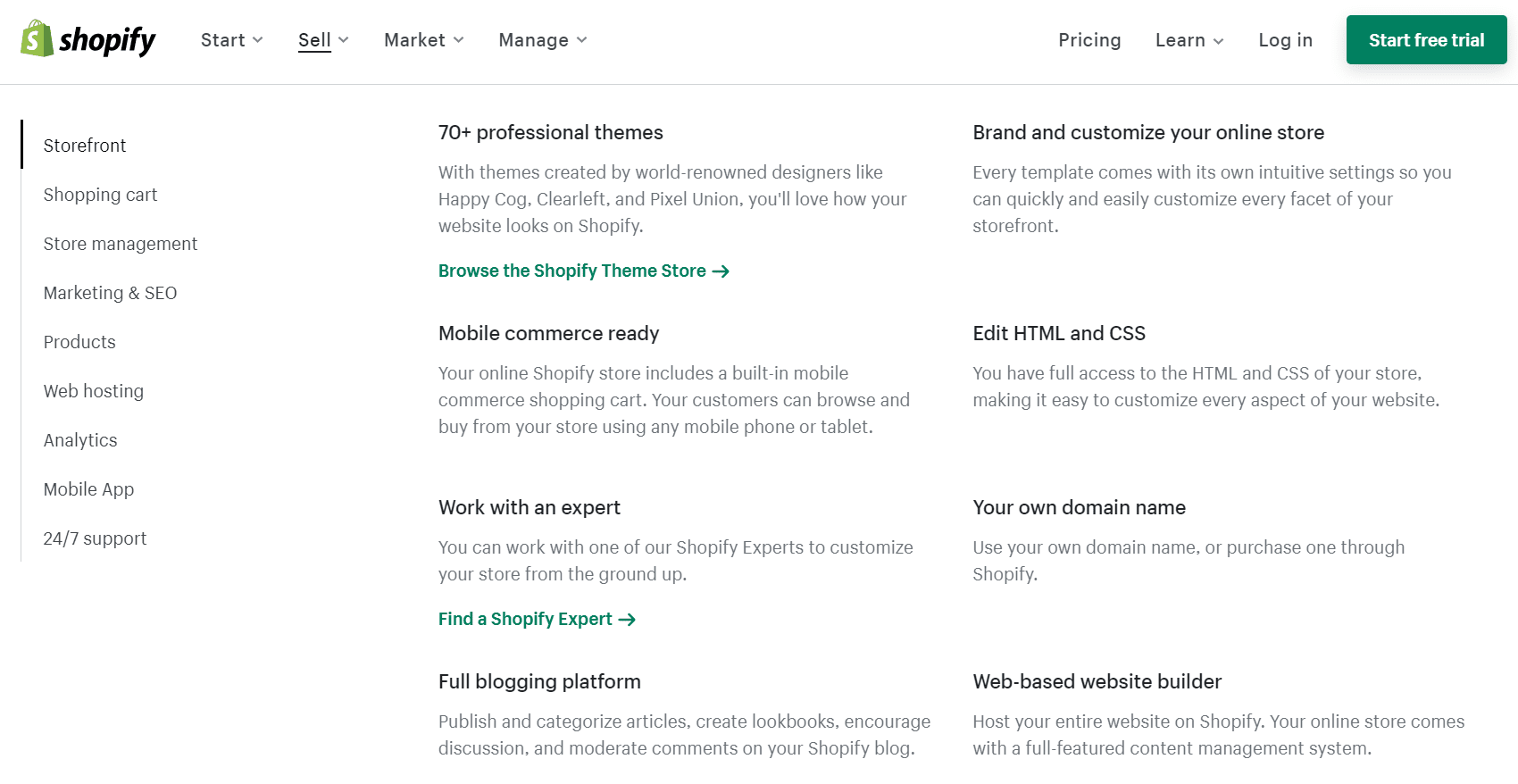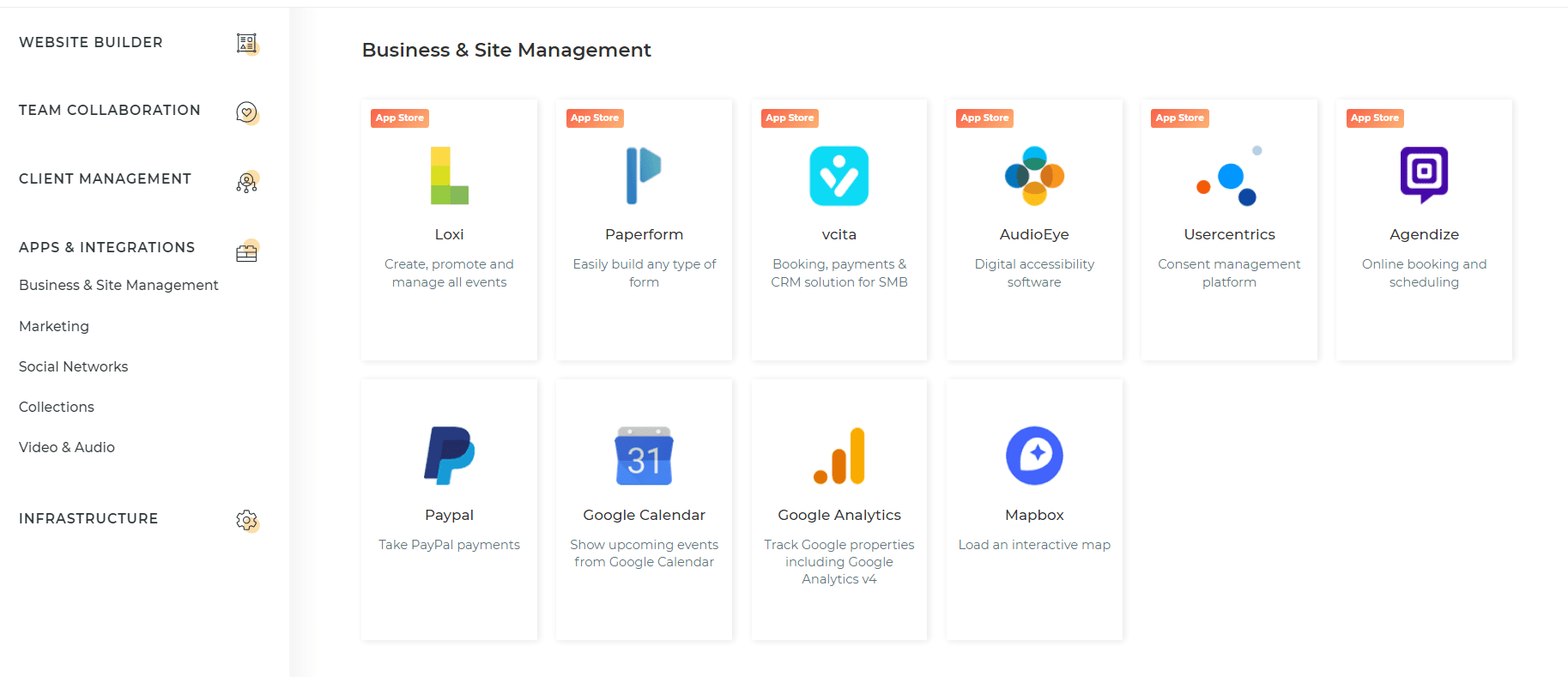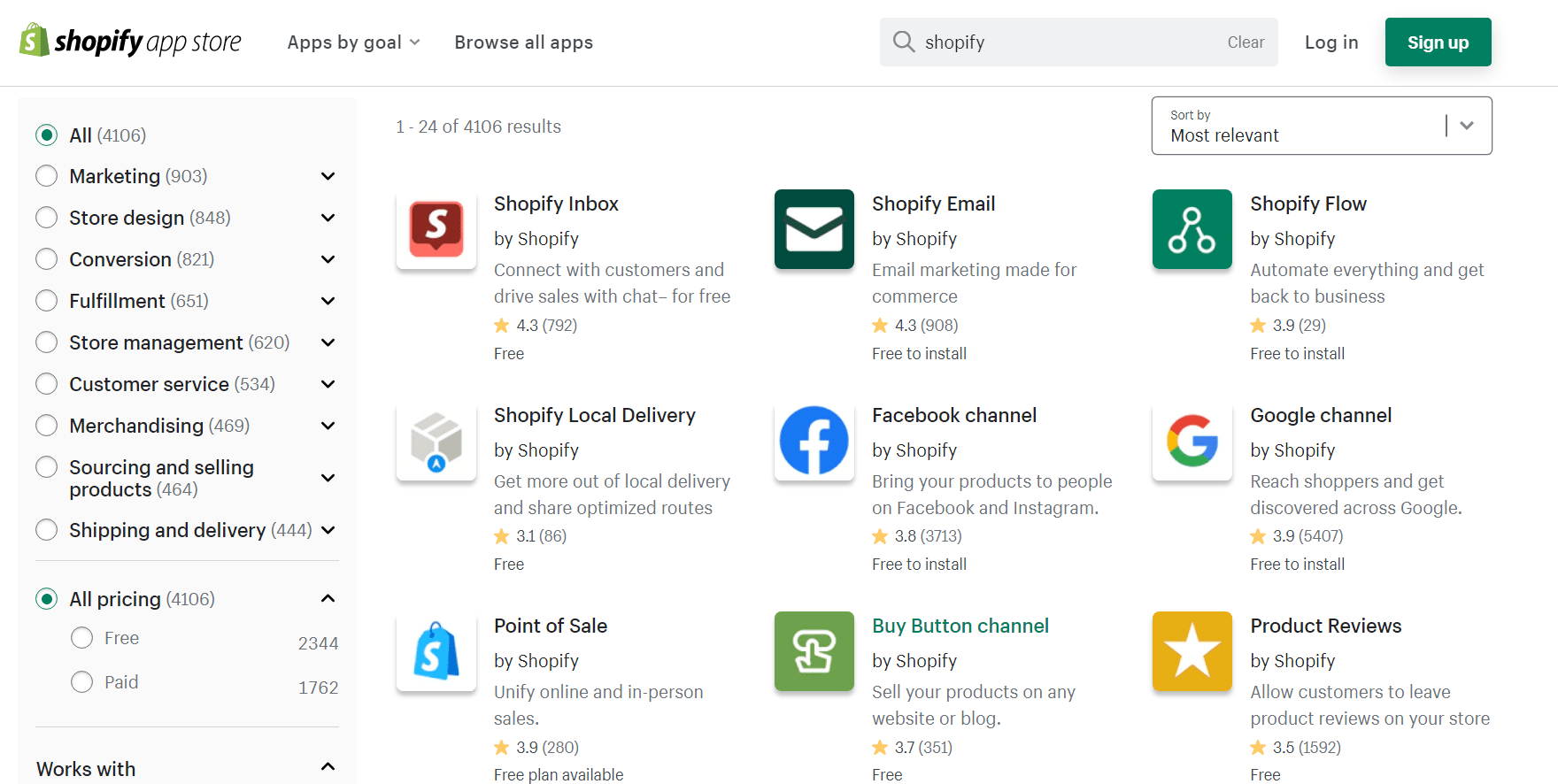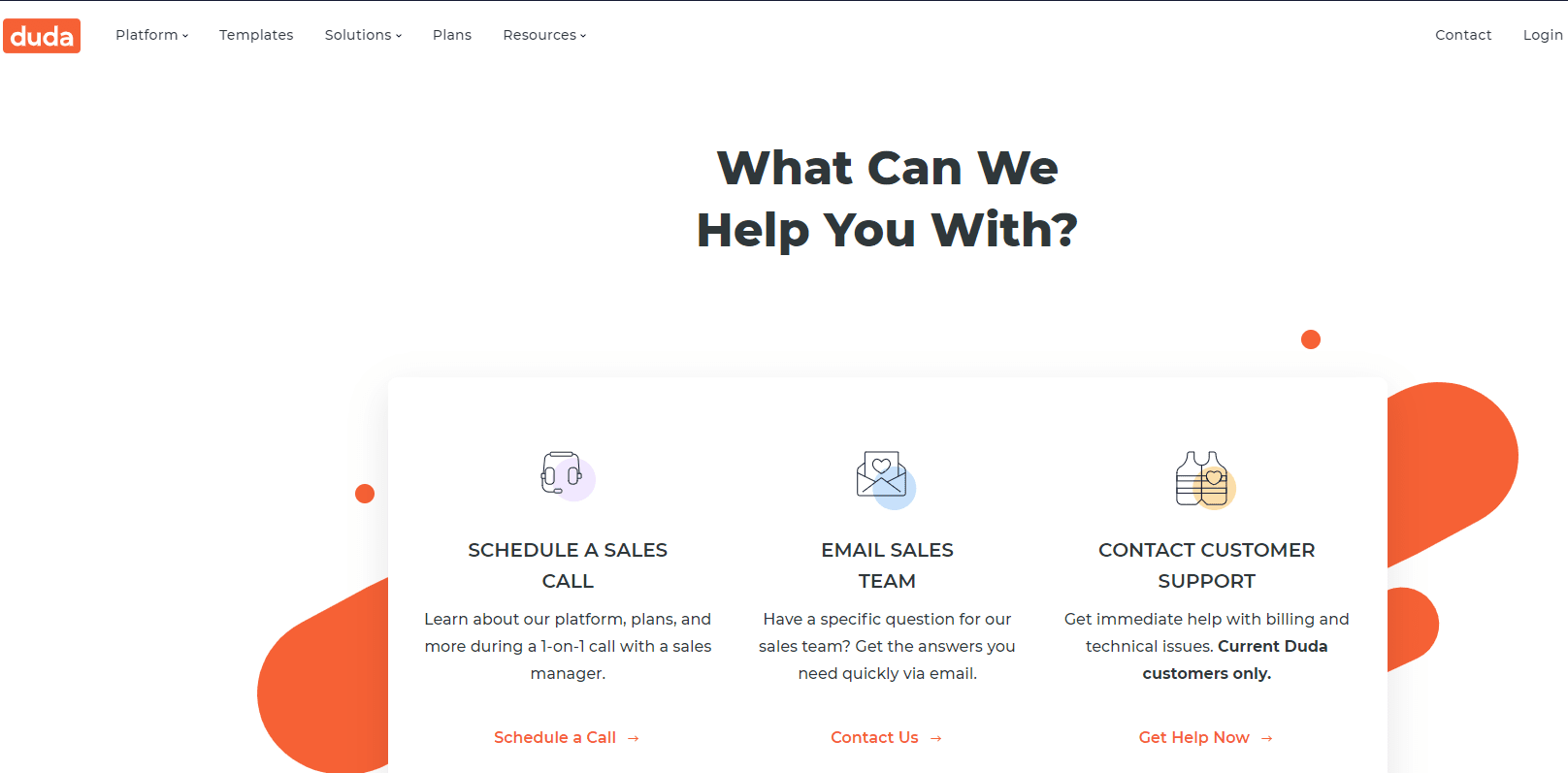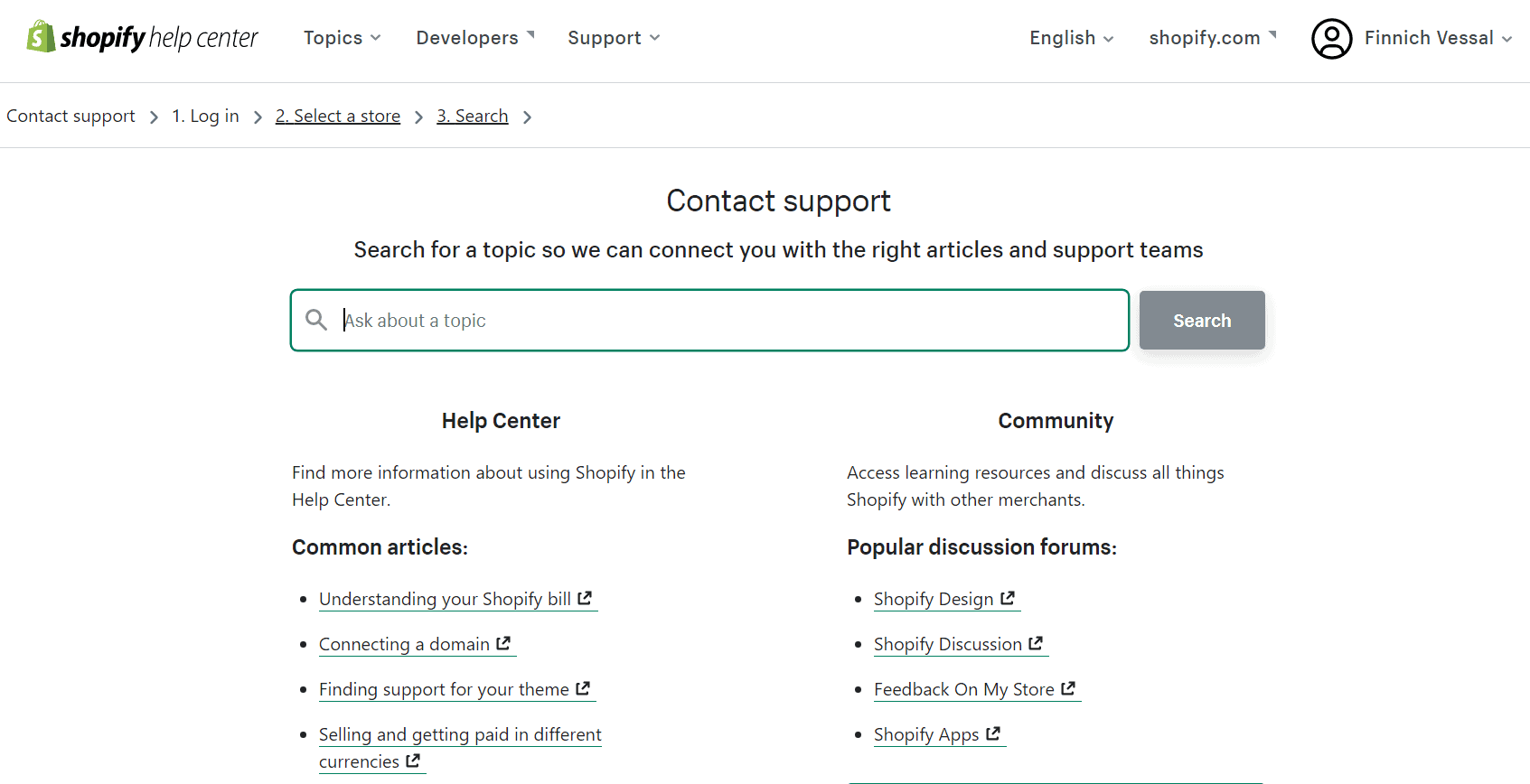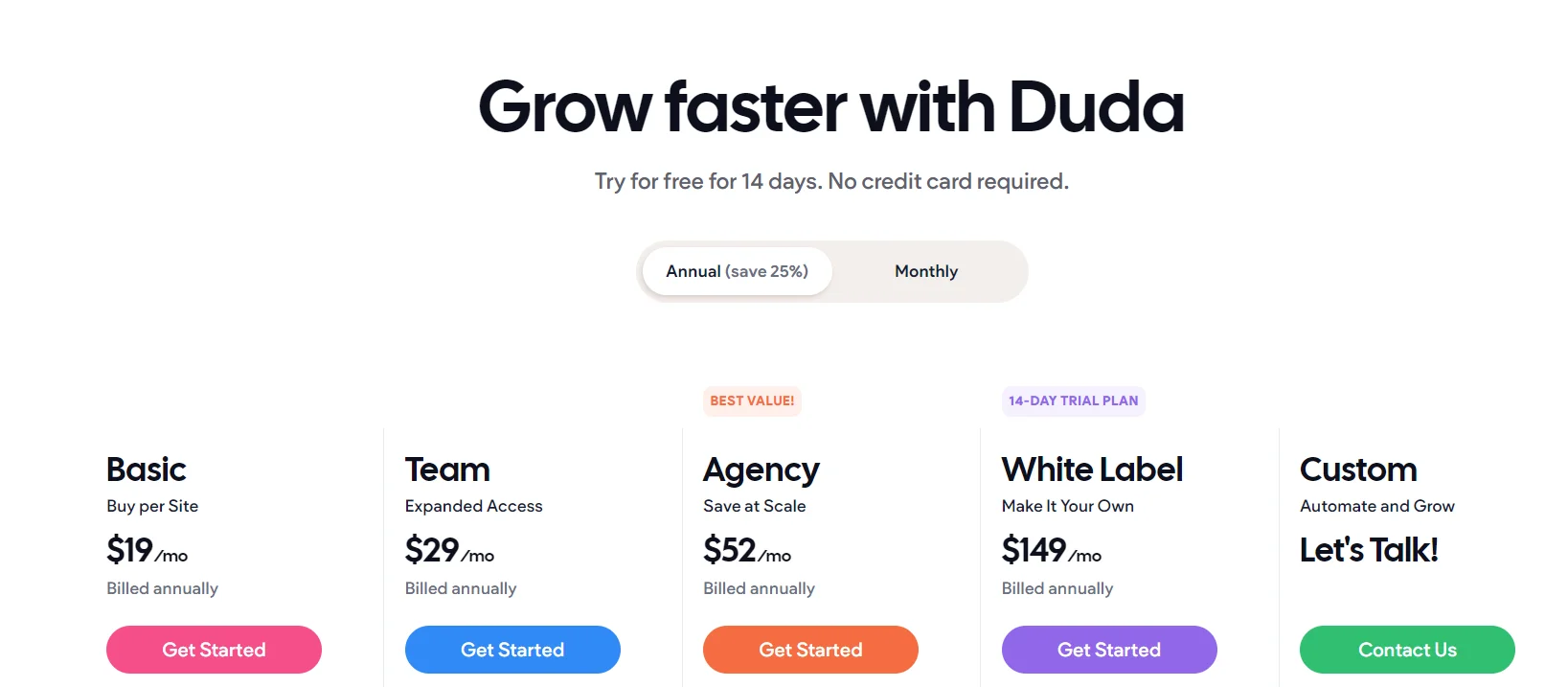In this article, you will find:
- What is Duda
- Pros
- Cons
- What is Shopify
- Pros
- Cons
- Duda Vs Shopify Comparision
- User Interface
- Features
- Integrations
- Customer Support
- Pricing
- Quick Comparision
- FAQs
- Final Words on Duda vs Shopify
Quick Review:
If you are in a hurry and want to just know what is best for what, then this quick review is for you.
Duda is a professional website builder platform for Agencies, Saas platforms, and hosts. Also known to be one of the fastest website builders.
Shopify is an excellent platform for selling any kind of product online. It is a commercial platform that is best for any small business that sells products on a demand basis.
Duda vs Shopify 2026: Overview
But before starting the comparison, let’s take a quick look at Duda and Shopify platforms.
What Is Duda?
Duda is a professional website builder platform for agencies, SaaS platforms, and hosts.
It helps businesses create responsive, SEO-friendly websites that are easily accessed from any device or platform.
Every step of the site-building process has been optimized by Duda to offer its customers high speed and efficiency.
From building sites to managing content and tracking site performance, Duda offers powerful tools that enable users to easily create professional websites in a matter of minutes.
Pros:
- Duda website builder is straightforward to use, even for beginners.
- It provides numerous easily customizable templates.
- Its drag-and-drop builder does the difficult work of modifying different elements of your website very simply.
- It provides the facility of automatic backup whenever any change is done to your website.
- It offers an Analytics tool to monitor your website visits and other data.
Cons:
- It does not provide an option for creating a newsletter.
- It is comparatively expensive to its other competitors.
- If you want to have your server and have full control over it, it is not for you.
What Is Shopify?
Shopify is an excellent platform for bringing your business online.
With Shopify, you can create a professional-looking online store with the click of a button, quickly and easily customize it to fit your brand, and start selling products right away.
It has many powerful tools that can be used to manage daily sales, attract more clients, and increase sales.
It also offers excellent customer service and support, as well as a collection of strong analytics tools that can help you comprehend your customers better and figure out how to best serve them.
Pros:
- It has a clean and comprehensive interface and is simple to use.
- Sound support system for customers.
- Robust speed and security mechanisms.
- A lot of themes for the storefront.
- Shopify offers its own App Store to provide features for different business needs.
Cons:
- Does not have a good Content Management System.
- It is not easily scalable for future requirements.
Duda vs Shopify Comparison
Based on their usability, features, integrations, customer support, and pricing plans, we will now make a stark comparison between Duda and Shopify. So let’s get going.
User Interface
Duda
Duda is well-known for its user interface. It offers a drag-and-drop editor so that you can easily place various elements on your website.
It saves you a ton of time and effort by completely eliminating the need for you to use web development languages like HTML, CSS, PHP, etc. by offering a variety of highly responsive designer templates.
Even non-tech users also can use it without any difficulty.
Shopify
An essential framework for setting up your store on Shopify is already provided.
The templates that Shopify offers are already optimized for different devices like tablets, desktops, and mobiles, so there is no need for any design expertise.
Instead of building your online store step by step, you just have to add and set the different pieces on your website, which is a convenient thing.
Winner: It is a tie between Shopify and Duda. Both are excellent in user-friendliness.
Features
The features of a website builder should match the needs of your website, as every website builder is not made to create a website of all categories.
Duda Features:
1. Design Control Features
Some of the design features offered by Duda include device-based editing, developer mode for editing HTML and CSS, shrinking headers, copying and pasting elements, content importing, text link customization, favicons, and customized 404 pages.
2. Team Collaboration tools
Duda comes bundled with amazing tools to help you successfully collaborate with your team on a given project.
These tools enable you to quickly communicate your ideas and changes to your team members. These consist of comment notifications, comment logs, and team member feedback.
3. Client Management Features
White label editing for your brand’s logo, automatic messages, Content collection forms, and SSL certificates.
4. Multilingual Support
Duda supports multiple languages for increasing the reach of your website to an audience globally.
5. eCommerce and Blogging
In its paid plan, Duda also supports creating an eCommerce site with Ecwid.
Duda only allows Facebook comments on blog posts, but you can add blog elements to your website with just one click.
Shopify Features
Shopify offers the following features:-
1. Themes & Templates
More than 70 professional themes created by well-known designers like Clearcraft and PixelUnion are available through Shopify.
These themes are easily customizable, and you also have the option to edit HTML and CSS. A Shopify expert can help you set up and create the look of your storefront.
2. Shopping Cart
You receive a free 256-bit SSL certificate with every Shopify store, which helps safeguard all types of information on your websites, such as credit card numbers and bank account information.
Other features under this category include abandoned checkout recovery, nearly 100 payment gateways, and flexible shipping rates.
3. Store Management
Shopify offers a variety of store management tools to help you quickly run your online business, including Customer Groups to organize your customers, Dropshipping, Refunds, and Managing on the go, which lets you manage your business from your phone.
It also offers personalized email templates.
4. Marketing and SEO
Shopify sites have been optimized for search engines. A sitemap.xml is automatically created for your products and websites. Discounts, Facebook sales, and gift cards are some of Shopify’s features in this category.
5. Inventory Management
The option to use Shopify for inventory management is available. When a product runs out of stock, it automatically prevents you from selling it. It keeps track of your stock counts.
Winner:
In this case, both Shopify and Duda are winners in their aspects; Duda has excellent features for building any type of website;
However, if we talk about eCommerce-related websites, no one can beat Shopify.
Integrations
To increase the visibility and conversion of your website, every website builder must offer integration with multiple features and tools on the market.
Duda Integrations
Duda promises integrations with multiple business and site management tools, including voice, AudioEye, Agendize, Paypal, and Google Calendar.
It also offers integration with Uberall, Yext, and Mailchimp for lead generation.
You can also integrate social media platforms, such as Facebook, Instagram, Pinterest, Whatsapp, Reddit, and others.
Shopify Integrations
Shopify also offers a variety of third-party integrations, which you can find in the Shopify app store.
For example,
the Hubspot plugin can help you drive more traffic to your store, while the Shoelace integration enables you to create customized ads for specific clients to keep them interested in your website.
Klaviyo is a marketing tool that you can integrate to increase your sales. Additionally, it allows for the integration of various social media channels.
Winner: Shopify is the winner here.
Customer Support
Having a sound support system is essential.
If you get stuck at any step during your project’s development, then your website builder should be such that it provides channels for immediate help.
Duda Customer Support
Duda offers a variety of ways to connect with and assist its users.
It offers the option to submit a request if you need some one-on-one assistance with your issue and has a comprehensive knowledge base that can be used to understand how everything works and what each feature does in detail.
Support is also offered via phone and live chat during set hours.
Shopify Customer Support
Shopify strives to deliver phone support around the clock. Additionally, email and social media are two ways you can get in touch with it.
If you need prompt responses, they also offer live chat support around the clock. They also have a help center with a variety of hints and information to help you along the way.
Winner: Both provide massive support to their customers, but due to the availability of contacting Shopify anytime, it is one step ahead of Duda.
Also Read: Woocommerce vs Shopify
Pricing:
One of the first considerations when choosing a website builder plan is the price and available features in the plan
It should be set so that it fits within your budget while still offering all the features you need.
Duda Pricing Plans
Currently, Duda offers four pricing plans and an additional plan for completely customizing your purchase. The four plans are:
1. Basic
- Cost: $19/month (billed annually)
- Hosting: 1 site on AWS
- Add Site: $14.25/month
- Support: Email
- Uptime: 99.99% SLA
- Features: AI Content Assistant
2. Team
- Cost: $29/month (billed annually)
- Hosting: 1 site on AWS
- Add Site: $12/month
- Support: Email
- Uptime: 99.99% SLA
- Team Members: 3
- Features: Dynamic pages, client management, AI Content Assistant, AI SEO Assistant
3. Agency
- Cost: $52/month (billed annually)
- Hosting: 4 sites on AWS
- Add Site: $9.90/month
- Support: Priority
- Uptime: 99.99% SLA
- Team Members: 6
- Features: Dynamic pages, client management, site export, AI Content Assistant, AI SEO Assistant
4. White Label
- Cost: $149/month (billed annually)
- Hosting: 4 sites on AWS
- Add Site: $9.90/month
- Support: Priority
- Uptime: 99.99% SLA
- Team Members: 6
- Features: Full white labeling, custom platform domain, branded client communication, support portal, branded client login, AI Content Assistant, AI SEO Assistant
5. Custom
- Cost: Contact for pricing
- Support: 24×7
- Uptime: 99.99% SLA
- Team Members: Unlimited
- Features: External dataset integration, client management, site export, DIY/Simple Editor, full API access, SSO, Native Widget Builder, dedicated account manager, enterprise-grade security, AI Content Assistant, AI SEO Assistant
Shopify Pricing Plans
Along with offering a free trial for a certain period, it provides the following plans:
1. Basic
- Cost: $18/month (billed annually)
- Features: 10 inventory locations, 24/7 chat support, localized global selling (3 markets), POS Lite
- Card Rates: 2% (3rd-party payment providers)
- Trial: $0.25 for the first month
2. Shopify
- Cost: $67/month (billed annually)
- Features: 10 inventory locations, 24/7 chat support, localized global selling (3 markets), 5 additional staff accounts, POS Lite
- Card Rates: 1% (3rd-party payment providers)
- Trial: $0.25 for the first month
3. Advanced
- Cost: $273/month (billed annually)
- Features: Custom reports and analytics, 10 inventory locations, enhanced 24/7 chat support, localized global selling (3 markets + add markets for $59 each), 15 additional staff accounts, 10x checkout capacity, POS Lite
- Card Rates: 0.6% (3rd-party payment providers)
- Trial: Available on a 1- or 3-year term
4. Plus
- Cost: $2,100/month (on a 3-year term)
- Features: Custom reports and analytics, 200 inventory locations, priority 24/7 phone support, localized global selling (50 markets), unlimited staff accounts, fully customizable checkout with 40x capacity, 200 POS Pro locations with Shopify Payments, sell wholesale/B2B
- Card Rates: Competitive rates for high-volume merchants
Winner: Duda is the winner here as it provides more affordable pricing options.
FAQs About Duda vs Shopify
Does Shopify support multiple languages?
Yes, Shopify offers to make the websites appear in the native languages of your customers.
Is Shopify suitable for beginners?
Definitely, Shopify is easy to learn and provides a lot of help and support in starting with it.
❓Can I migrate my existing site to Duda?
You can recreate your website using Duda but can't migrate.
Quick Links:
- Duda Vs Squarespace
- Duda Vs WordPress
- Webflow Vs Webnode Vs Duda
- WordPress Vs Duda Vs Wix vs Weebly
- Duda Vs Elementor: Ultimate Comparison
Final Words: Duda vs Shopify 2026
The conclusion we can draw from this comparison between Duda and Shopify is that both platforms are excellent in their own right.
The Duda website builder is intended for people who want to create a custom website for business purposes, launch an online venture, or work with agencies that provide website design services.
By contrast, Shopify’s main goal is to create an online store to increase sales.
Because of this, its features are primarily business-oriented. As a result, Shopify and Duda are both among the top website builders.
Shopify is best for eCommerce websites, and Duda is best for designing personal, professional, and small-medium business websites and there is no debate about it.
Therefore, you can choose Duda if you want to design a website for any purpose other than creating an online store.
On the other hand, Shopify is unquestionably the best option for launching, growing, and scaling your online store.
If you find this review useful, please like and share it. Also, feel free to share your opinions below.

